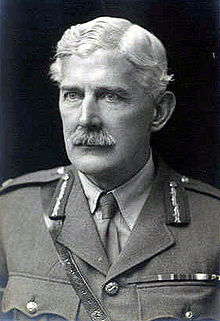George Montague Harper
| Sir George Harper | |
|---|---|

Lt-Gen Sir George Harper
|
|
| Born | 11 January 1865 Batheaston, Somerset, England |
| Died | 15 December 1922 (aged 57) Sherborne, Dorset, England |
| Buried at | London Road Cemetery, Salisbury, Wiltshire |
| Allegiance |
|
| Service/branch |
|
| Years of service | 1884 - 1922 |
| Rank | Lieutenant-General |
| Commands held |
17th Brigade 51st (Highland) Division IV Corps Southern Command |
| Awards |
Knight Commander of the Order of the Bath Distinguished Service Order |
Lieutenant-General Sir George Montague Harper KCB DSO (11 January 1865 – 15 December 1922) was a senior officer of the British Army during the First World War.
As a protégé of General Henry Wilson, he held important staff positions at the War Office before the war and at British Expeditionary Force (BEF) GHQ in 1914. He later commanded the 51st (Highland) Division at the Battles of the Ancre, Arras, Third Ypres and Cambrai. It was widely claimed by tank officers that his adoption of idiosyncratic tactics at Cambrai caused his division's failure to reach its objectives, although this view has now been called into question. He commanded IV Corps in 1918.
Harper was born on 11 January 1865 in Batheaston, Somerset, the son of Charles and Emma Harper. His father was a physician and surgeon.
George Harper was educated at Bath College and at the Military Academy at Woolwich.
Harper was commissioned into the Royal Engineers in 1884. In 1899 he was deployed to South Africa where he joined 37th Field Company RE and saw action at Spion Kop, Val Kranz, Tugela Heights and Pieter's Hill. He was awarded the Distinguished Service Order (DSO) in November 1900 for his service in South Africa.
...
Wikipedia
